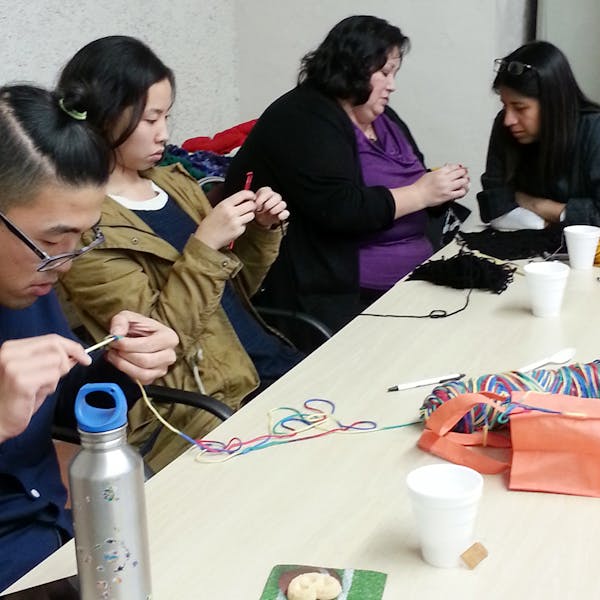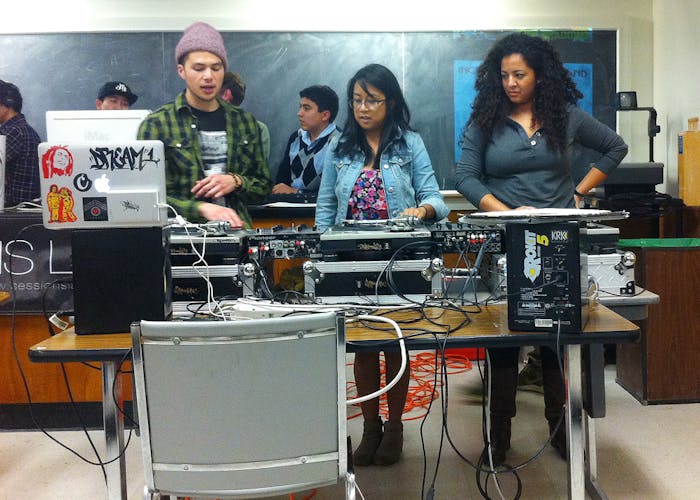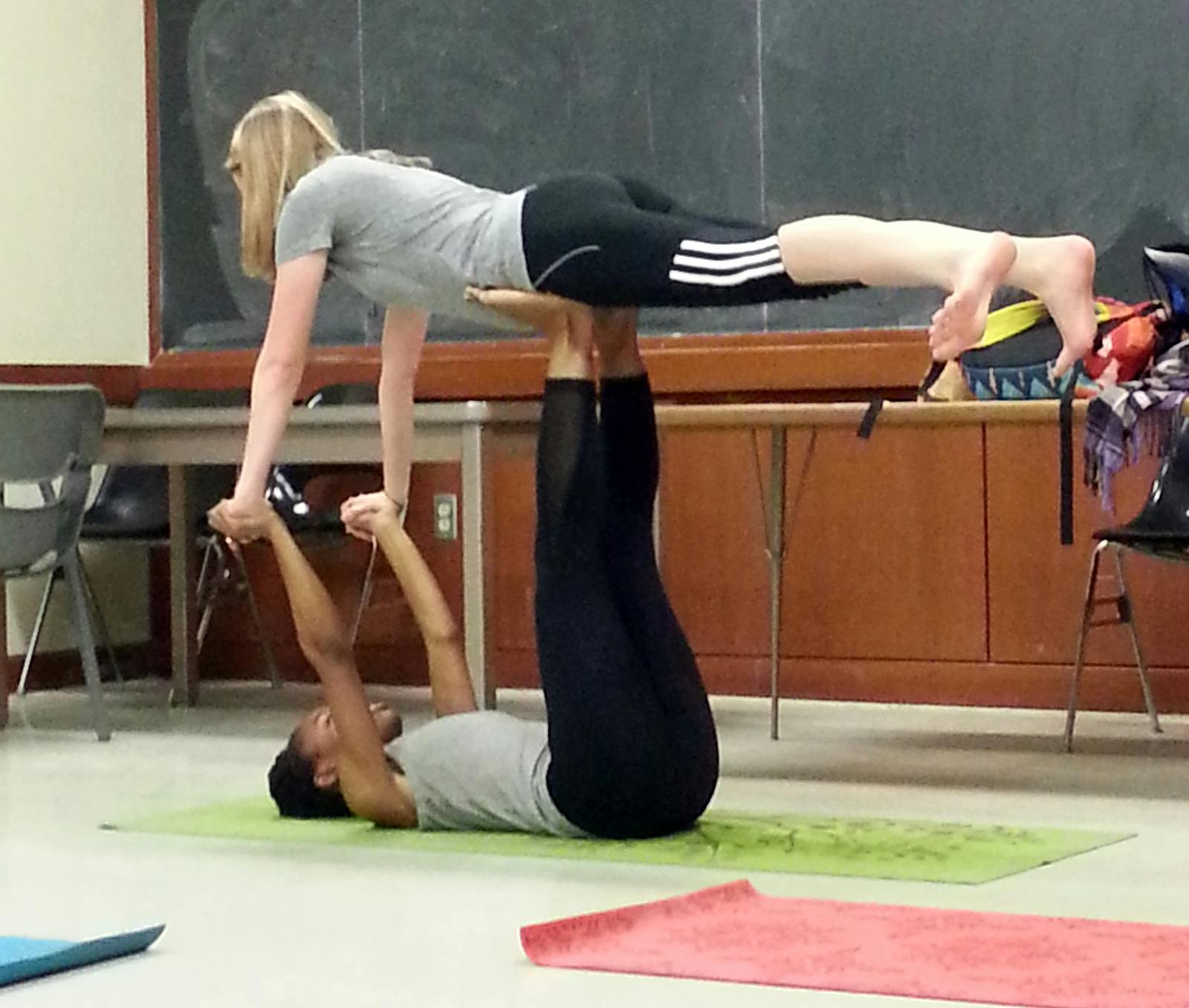TEP staff and faculty organized workshops presented by teacher candidates for self-realization and self-nurturing for educators.
As a faculty member in UCLA’s Teacher Education Program (TEP), Laura McMullin and her colleagues realized that in addition to the program’s commitment to preparing teachers to work in some of the most challenged schools through TEP’s residency model, there was a key element missing that they wanted to address.
“Stress is endemic in our society nowadays,” she says. “Those of us who work with TEP students recognized that they were under a significant amount of stress so we wanted to do something to support their well-being. It’s amazing how complex the life of the classroom is,” observes McMullin. “That’s why it baffles me that we hardly pay attention to teachers’ well-being in our profession.”

McMullin, a TEP alumna herself (‘01) and Elexia Reyes-McGovern, a TEP faculty advisor, organized a day of workshops in February that gave both novice and resident teachers the opportunity for self-exploration, new experiences, and the chance to focus on their own well-being.
Reyes-McGovern and McMullin, who had no budget for the event, worked with UCLA’s TEP faculty, who were instrumental. Several TEP Advisors offered to bring home-baked goods and healthy food options, while others signed up to escort students to their workshop. Everyone helped with logistics on the day of the event like moving furniture in the rooms and helping workshop leaders with their equipment. Food for the event was provided with donations from Trader Joe’s and the generous support of Annamarie Francois, executive director of Center X, who provided dinner for everyone.
This team effort included the participation of TEP students and residents themselves, who led a variety of workshops that introduced a variety of meaningful and creative experiences for their peers, including yoga, guided meditation, renewal through drawing, Thai kickboxing, mindfulness and movement games, and sound healing.
Courtney Young is a student teacher and a master’s degree candidate earning her English credential. She shared her expertise with acro-yoga – a blend of acrobatics and yoga – to give her peers a chance to go with the “flow.”
“Having a yoga practice brings each individual a quietness of the mind, an awareness of the body, and a lifting of the spirit,” she says. “This experience helped the teachers to get in touch with their bodies and figure out exactly how they feel.
“Taking care of your own well-being is necessary if you plan to take care of other people,” says Young. “If teachers neglect their own wellbeing, then they leave room for their immune systems to be weakened and stress to affect the quality of their practice. Teachers can only give students what they have, and if they do not come into the classroom with the necessary energy and planning, then, ultimately, the students will suffer.”
McMullin, who has previously served as a classroom teacher in Los Angeles and New York City, says that she hopes the TEP Wellness event will begin an important discussion on what it takes to ensure well-being for educators. She says that several of her students are now volunteering for a pilot study on teacher stress, which is being proposed for the 2015-2016 school year.

“We didn’t just want this to be a fun, one-time event,” she says. “We wanted to shine the spotlight on teacher well-being, and have this be a springboard for an ongoing conversation to integrate greater well-being into TEP.” In fact, several students have expressed interest in forming a “TEP Wellness Team” in order to help shape the direction of this initiative.
McMullin notes that part of the problem is that “the least prepared teachers are oftentimes the ones sent to the highest-need schools,” namely, schools in low-income, high-poverty areas where they may not receive the support they need.
“We should be providing as much support as possible for new teachers,” she says. “And mentorship, for example, is hugely important to develop the competencies it takes to be a teacher because teaching is complex and can be stressful. There is promising research around teacher induction programs showing that when there is mentoring support for new teachers, almost like a bridge from their preparation to the field, it increases retention by 50 percent.
“We’re not very effective when we’re stressed – we’re reactionary,” McMullin says. “One of the things we know from the literature on teacher stress is that teachers who [work] under chronic conditions of stress are in the beginning of the burnout cascade. We also know that teachers who are under stress are unable to maintain positive classroom environments, so the climate of the classroom suffers. Positive relationships with the students suffer. They tend to be more disconnected from colleagues, so there’s that level of isolation, which is also problematic. It affects the teacher’s own health and ability to respond to student needs. Also, we have a huge attrition problem in this country. Within the first five years, 50 percent of teachers leave the profession. Teaching has been identified as having a high rate of attrition compared to other professions so it’s important to look at how we can retain our teachers. Focusing on well-being could certainly help.”
McMullin says that research shows that when teachers report a state of well-being, students respond positively. Young echoes the sentiment, saying that teachers who are in a state of well-being serve as a good example for their own students.
“I firmly believe that one cannot learn if they are not in a space to receive new information,” she says. “As a teacher, I commit a lot of my time to planning lessons and curriculum, reading articles, and looking for resources to make every class period exciting and academically stimulating. If I continued to prepare classes for my students, and failed to take care of my own physical, mental, and emotional wellness, then my students would suffer in the classroom and, I would be unable to adequately prepare for students because I would be continuously stressed out, over worked, and or sick.
“Learning takes energy and willpower. If you are stressed or overworked, then, as a teacher, it is difficult to adequately engage in the planning and implementation of lessons for students. By constantly reminding students of how important it is to take care of yourself teachers can definitely instill the idea that well-being and learning are connected.”
For a video clip of McMullin’s talk on “Self Care for Teachers,” click here.
Above: TEP master’s candidate Courtney Young (on yoga mat) propels a fellow student to new heights of exercise and self-nurturing in her workshop on acro-yoga.
Photo by June Chou
